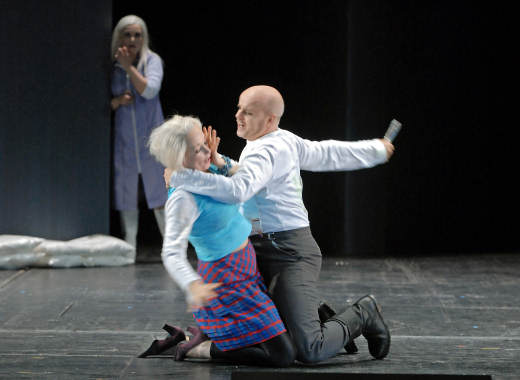Other Links
Editorial Board
- Editor - Bill Kenny
Founder - Len Mullenger
Google Site Search
SEEN
AND HEARD INTERNATIONAL OPERA REVIEW
Leoš Janáček, Jenufa
: Soloists, Chorus and
Orchestra of the Nationaltheater Mannheim, Conductor:
Friedemann Layer, Mannheim 5.7.2008 (BM)

Ludmilla Slepneva (Janufa) and Uwe Eikötter (Laca)
Although much is made of Janáček’s postulate that
“truth of expression can only be achieved by carefully
observing life” in the program notes and other
material published by the theater in connection with
this production, director Regula Gerber seems to have
decided that the ‘truth’ or ‘reality’ to be conveyed
here is the structural inexorability of the ‘mill of
life’, full of individuals bogged down by hopelessness
and ugliness. The only trouble is that she completely
ignored the rural environment initially envisaged for
this piece, with its bearing on the moral and
religious problem of having a child out of wedlock.
Surely, in the surroundings shown on stage (I kept
expecting someone to come forward and announce
“Welcome to Berzerkistan!”), no one would care less
about that sort of mishap. And it is interesting to
remember that when Gabriela Preissová, whose play “Her
Stepdaughter” inspired this opera, was criticized for
choosing such shocking subject matter – the
infanticide committed by the stepmother to save her
daughter’s honor - she pointed out that it was based
on a true event in a Bohemian village which she had
read about in a newspaper clipping, making her play
something of a turn-of-the-century reality show (if
there is any way to use this term without its
derogatory connotation). However, this was apparently
not enough reality for Gerber. There is nothing wrong
with telling a story from a new perspective (on the
contrary!), but perhaps I should leave it to those
more intellectually versed than myself to decide
whether this is still the same story. It certainly
didn’t look like it - so thank heavens that it sounded
authentic.
Friedemann Layer had the orchestra seething with
passion (those familiar with this work know that this
is not background music), while at the same time
paying precise attention to the nuances of the score
and never covering up the singers, who were all
excellent, as was Tilman Michael’s fantastic chorus.
Ludmila Slepneva in the title role was a fervent
Jenufa, with confident top notes and emphatic phrasing
in her monologue following the loss of her child,
outsung only by Susan Maclean in the role of her
stepmother Kostelnička, who drew an outstanding
portrait of this dried-out prune of a woman, starved
for affection but still capable of lavishing so much
of it on her step-daughter. The duet in which both
bare their wounded souls in the second act was deeply
moving.
Emma Sarkisyan was a wonderful Grandmother
Burya, Katharina Göres as Karolka has a new voice one
hopes to hear again soon, and Michail Aganov did well
as the adventurous Stewa (Gerber’s concept required
him to look like a awful slob, but he did his best to
remind us what Jenufa saw in him), as did Mihail
Mihaylov later on as the Judge. But it was Uwe Eikötter’s
Laca that stood out: he was utterly convincing and lent a
definite italianità to his iridescent declaration of
love in the final scene. All of these characters crave
love, and it is all there in the music: spiritual and
romantic love, maternal love, unrequited love, fierce
and violent love, jealous love, blind and desperate
love. Indeed, the title “What We Talk About When We
Talk About Love” might almost suit this opera better
than the immortal short story by Raymond Carver. What
an enduring gift this composer bestowed on us, and we
should be grateful to musicians like these in Mannheim
who can bring it so fully to life.
Bettina Mara
With special thanks to my father, Richard Exner, for encouraging me
to attend this performance and for teaching me a thing or two about
love.
Back to Top Cumulative Index Page
